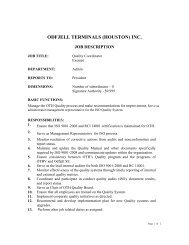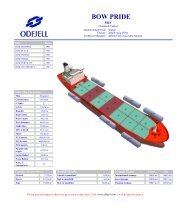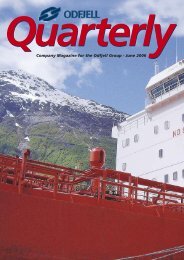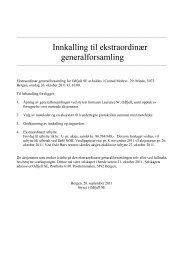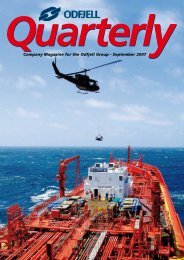Company Magazine for the Odfjell Group - March 2005
Company Magazine for the Odfjell Group - March 2005
Company Magazine for the Odfjell Group - March 2005
- No tags were found...
You also want an ePaper? Increase the reach of your titles
YUMPU automatically turns print PDFs into web optimized ePapers that Google loves.
Piracy<br />
Armed robbery on <strong>the</strong> high seas<br />
By Klaus Walderhaug and Frode Bjørklund<br />
Seafarers have always been exposed to<br />
<strong>the</strong> perils of <strong>the</strong> sea: hostile wea<strong>the</strong>r,<br />
collisions and grounding, fire and noxious<br />
fumes, flooding, sinking, capsizing,<br />
loss of propulsion or steering and any<br />
o<strong>the</strong>r hazards resulting from <strong>the</strong><br />
unique environment of <strong>the</strong> sea. The<br />
list of dangers is long. The topic has<br />
been a popular motive in paintings, a<br />
thrilling background in film and literature,<br />
and <strong>the</strong> inspiration to many a<br />
song and tune. Dramatic incidents are<br />
always thoroughly covered by <strong>the</strong><br />
press.<br />
Modern technology and an increasingly<br />
risk adverse society have made both<br />
<strong>the</strong> marine venture and <strong>the</strong> sailors’<br />
lives safer. However, ano<strong>the</strong>r external<br />
threat still remains which authorities<br />
and <strong>the</strong> shipping community are<br />
struggling to combat: Piracy.<br />
Ancient piracy<br />
Piracy has been an adverse side of life<br />
at sea <strong>for</strong> thousands of years. Both <strong>the</strong><br />
old Egyptians back to <strong>the</strong> days of <strong>the</strong><br />
Pharaohs and <strong>the</strong> ancient Greeks tell of<br />
piracy on <strong>the</strong> Mediterranean<br />
trade routes, attacks mostly originating<br />
from North Africa. The<br />
Romans struggled with Vandal,<br />
and later also Muslim, pirates, disturbing<br />
<strong>the</strong> trade routes to Africa<br />
and <strong>the</strong> East. The eastern part of<br />
<strong>the</strong> Mediterranean was particularly<br />
infested with pirates, operating<br />
out of <strong>the</strong> coast of what today is<br />
Turkey. Despite being an obstacle<br />
to <strong>the</strong> sea trade, Rome was still<br />
reluctant to crack down on <strong>the</strong><br />
pirates as <strong>the</strong>se were also prime<br />
suppliers of slaves to <strong>the</strong> Roman<br />
Empire. The Romans actually had<br />
fairly strict anti-piracy laws, opening<br />
<strong>for</strong> prosecution of pirates<br />
and imposing heavy fines <strong>for</strong><br />
those harbouring <strong>the</strong>m, but <strong>the</strong>se<br />
were rarely en<strong>for</strong>ced. Rome were<br />
struggling with civil wars as well<br />
as conflicts on many of its borders,<br />
and was not able to free <strong>the</strong><br />
necessary resources to combat this<br />
evil. To avoid being plundered<br />
and terrorized, many port cities<br />
around <strong>the</strong> Med started providing<br />
services and facilities to <strong>the</strong> pirates or<br />
paid tribute to <strong>the</strong>m. The pirates grew<br />
bolder, started raiding islands and cities,<br />
taking prisoners <strong>for</strong> ransom. As a<br />
young man even Julius Caesar were<br />
captured by pirates. At a time <strong>the</strong> pirates,<br />
operating more than 1,000 ships<br />
and having captured or raided 400<br />
cities, were so dominating that trade<br />
throughout <strong>the</strong> Mediterra-nean virtually<br />
halted. Finally, Rome had to act, and<br />
in 67 BC Commander Pompey was<br />
awarded <strong>the</strong> task of getting rid of<br />
<strong>the</strong> pirates. With a <strong>for</strong>ce of 120,000 troops,<br />
4,000 cavalry, 270 ships and sufficient<br />
resources to fund his mission, he<br />
managed to scare most of <strong>the</strong> pirates<br />
into obedience and to defeat <strong>the</strong> rest.<br />
Saturday <strong>March</strong> 12th <strong>2005</strong>, a gang of<br />
35 pirates armed with machine guns<br />
and rocket launchers boarded <strong>the</strong><br />
Indonesian product tanker Tri Samudra<br />
in <strong>the</strong> Malacca Strait, on its way to<br />
Belawan, Indonesia with a full load of<br />
oil cargo. The pirates took control of<br />
<strong>the</strong> tanker and ordered it to sail<br />
towards Dumai. Later <strong>the</strong>y abandoned<br />
<strong>the</strong> ship, kidnapping <strong>the</strong> master and<br />
<strong>the</strong> chief engineer. The owner received<br />
a ransom demand <strong>for</strong> a 2 billion rupiah,<br />
approx. US$ 210,000.<br />
17th century naval warfare.<br />
The golden age of piracy<br />
In <strong>the</strong> 16th century piracy was again<br />
growing as a menace to <strong>the</strong> sea trade.<br />
European colonial expansion in South<br />
America, Africa and Asia resulted in<br />
ships carrying gold, silver and o<strong>the</strong>r<br />
valuable goods. Better, bigger and<br />
faster ships were being built, allowing<br />
<strong>the</strong> pirates <strong>the</strong> advantage of manoeuvring<br />
equality or even superiority to<br />
<strong>the</strong>ir preys. Competing interests and<br />
ambitions of <strong>the</strong> colonial powers gave<br />
room <strong>for</strong> ambitious and ruthless sailors<br />
to find ways of legalizing even <strong>the</strong><br />
worst acts of piracy, as several countries<br />
recruited privateers to act in <strong>the</strong> interest<br />
of <strong>the</strong>ir respective crown. In this<br />
way English privateers could, with<br />
impunity, attack and rob Spanish ships,<br />
whilst North African pirates were licensed<br />
to rob English ships.<br />
In <strong>the</strong> early 1500s, <strong>the</strong> so-called<br />
Barbarian states in Nor<strong>the</strong>rn Africa<br />
became centres <strong>for</strong> pirates. The sultans<br />
of Tunisia, Algeria and Morocco encouraged<br />
piracy as an important source of<br />
revenue, and during <strong>the</strong> 17th century<br />
<strong>the</strong>se pirates became a menace to <strong>the</strong><br />
European merchant navies. By 1650<br />
more than 30,000 captives by pirates<br />
were imprisoned in Algeria alone, and<br />
many European sailors were sold as<br />
slaves or, if coming from a family<br />
of means, exchanged against a<br />
ransom. In many countries <strong>the</strong>re<br />
were organised "ransom relief<br />
funds", giving aid and loans to<br />
families trying to bring back<br />
<strong>the</strong>ir loved ones from imprisonment<br />
in Nor<strong>the</strong>rn Africa.<br />
Several countries, among <strong>the</strong>m<br />
Denmark/ Norway and <strong>the</strong><br />
United States, were paying to<br />
<strong>the</strong> Barbarian sultans <strong>for</strong><br />
immunity against piracy attacks.<br />
A number of attacks were made<br />
against <strong>the</strong> pirate nests, and<br />
finally in 1830 <strong>the</strong> French managed<br />
to end <strong>the</strong> North-African<br />
piracy.<br />
Perhaps <strong>the</strong> best known of <strong>the</strong><br />
pirates, and <strong>the</strong> ones mostly<br />
pictured in books and by <strong>the</strong><br />
movie industry, are <strong>the</strong> buccaneers<br />
operating in <strong>the</strong> Caribbean<br />
Sea during <strong>the</strong> 16th and 17th<br />
century. The term buccaneer<br />
comes from <strong>the</strong> French 'boucan',<br />
a grill <strong>for</strong> smoking dried meat,<br />
referring to <strong>the</strong> fare on board <strong>the</strong> ships.<br />
The buccaneers were English, Dutch<br />
and French seafaring adventurers who<br />
preyed mainly on Spanish ships going<br />
to and from <strong>the</strong> Spanish American<br />
16 ODFJELL Quarterly <strong>March</strong> <strong>2005</strong>




